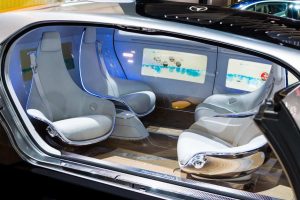My favorite technological advances are those that make life easier by eliminating tedious tasks such as driving through traffic. All I want to do is sleep when I’m in transit, luckily the folks at Google, Tesla, and Mercedes are working on making that a reality by 2020. These companies are making driverless cars mainstream. These vehicles serve not only to facilitate my laziness, but to make driving safer. Currently, 1.2 million deaths occur on the road annually. To reduce this number, driverless cars will eliminate mistakes made by drivers that are caused by both limitations in human information processing speed, and poor decision making. Additionally, like fine wine, the cars will improve over time, fixing their software and hardware limitations.

Interior of Mercedes Benz F015 retrieved from: https://www.abc.net.au/
Drivers are human, unlike machines, there are major limits to their ability to compute information. Distractions inside and outside the car impairs driving. This can result in unsafe driving and accidents. To test the effect of distractions on driving, researchers performed an experiment where data were gathered on test drivers being distracted. They determined that distractions increase the amount of time that the eye is fixated, and not paying attention to everything else that is happening on the road. This is unsafe, can lead to crashes, and is a problem that driverless cars will not have. The limitations that sensors in a car have can be reduced by fusing information from multiple advanced censors and processing it with ever improving ‘big data’ analyzing algorithms.

Driverless cars on public roads in Texas
video: https://www.youtube.com/
Driverless cars are not human, they are incapable of making decisions as poor as driving under the influence. After ingesting enough alcohol, a person’s reaction time, coordination, judgment, and senses will be incapacitated. Alcohol is a factor in over 40% of accidents on the road. In comparison to annual road death rates, there have been 18 crashes involving Google’s autonomous cars. For all but one of these, one without injuries, the self-driving cars have not been at fault. So far, there have only been two fatalities involved with self-driving cars. These accidents have led to reworks and more rigorous testing. Driverless cars would not be limited by poor decision making and reaction time will only vary based on the technology used.
The lack of driver error based on human limitations in capacity and some drivers’ liability for poor decision making outweigh current sensor and program limitations. However, until all cars on the road are driverless, we should drive carefully.
Alex Ponomarov
